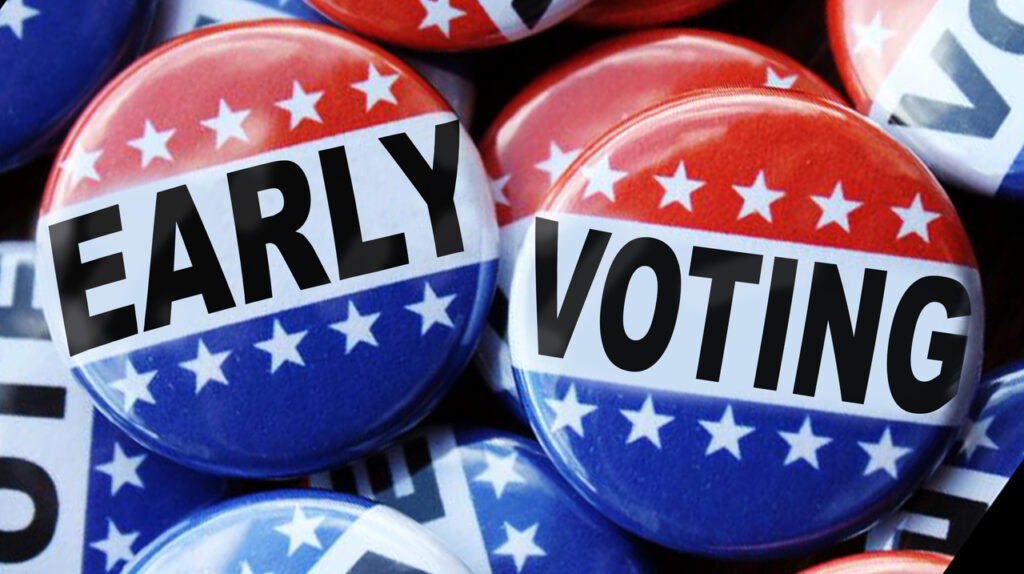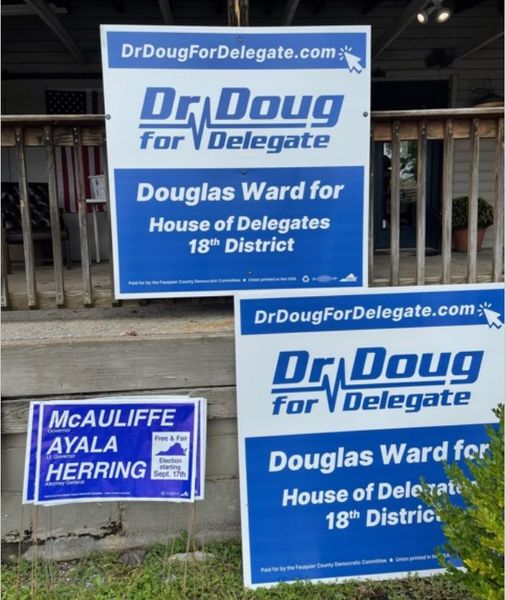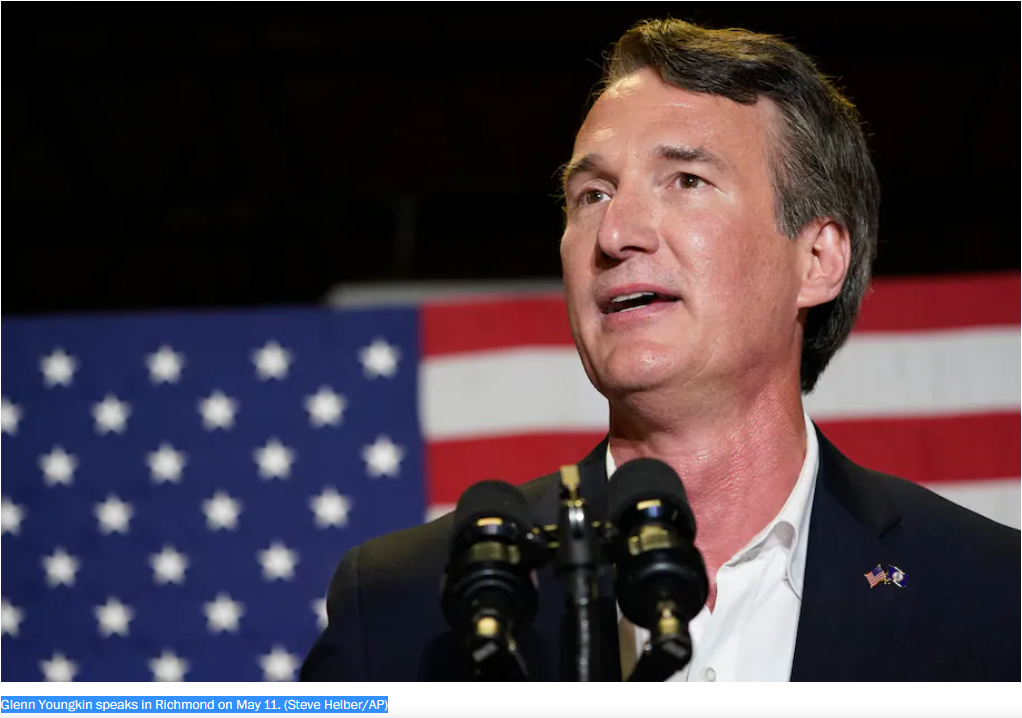Vote Now!

Remember, you can vote in person at the Registrar’s Office, 262A Gay Street, 8 to 4. The office is open for in-person voting on Saturday 10/23 and 10/30. On Election Day November 2, polls are open 6 am to 7 pm.

Remember, you can vote in person at the Registrar’s Office, 262A Gay Street, 8 to 4. The office is open for in-person voting on Saturday 10/23 and 10/30. On Election Day November 2, polls are open 6 am to 7 pm.

Yard signs and postcard packets
Monday September 20, 2021 between 2 and 4 pm
1047 Zachary Taylor HWY, Huntly VA
If that doesn’t work for you, we deliver! Contact us!

Campaign signs of all kinds are still available and can be delivered to your door. Contact Mary-Sherman Willis for delivery. If you’ve got a good spot for the 4-by-8-foot highway signs let us know!

Opinion by the WP Editorial Board, 7/31/2021
As Virginia Democrats have run the table in every statewide election since 2009, Republican gubernatorial aspirants have reverted to the same failed three-step playbook:
Now comes Glenn Youngkin, Virginia’s current Republican gubernatorial nominee — a slicker, wealthier version of past GOP hopefuls who poses as a new kind of candidate while peddling much the same nonsense.
Mr. Youngkin, who made a fortune in private equity, says Virginia’s economy is “in the ditch” — an assertion flatly contradicted by a tsunami of evidence to the contrary. And, like his predecessors, he claims lower tax bills are the elixir that would cure what ails the commonwealth.
Specifically, Mr. Youngkin, when asked this spring if he hopes to reduce or eliminate Virginia’s income tax, replied as follows: “We are absolutely focused on not just getting our state income tax down, but how can we in fact eliminate it?”
That very baloney was also peddled by Republicans Ed Gillespie, who lost the governor’s race in 2017; Corey Stewart, who narrowly lost the GOP primary that year to Mr. Gillespie; and former state attorney general Ken Cuccinelli, who lost in 2013. In each case, the conceit was that cutting taxes would attract new businesses to Virginia and help them grow faster. But what businesses, and which employees, would flock to a state that would decimate its tax base, thereby starving schools, roads, health care, parks, prisons and police of resources?
Here are the facts. Virginia’s individual income tax — the target of Mr. Youngkin’s fever dream — accounts for 72 percent of the state’s $43.5 billion of revenue in the current two-year general fund budget. (Most of the rest comes from sales, corporate and other taxes.) Take an ax to the income tax, and funding for vital services is decimated.
That’s not theory; it’s been tried, recently — in Kansas and Louisiana, in both cases by Republican governors who promised that cutting taxes would generate higher growth. In fact, the predictable result was that revenue shriveled, and so did state support for services Democrats and Republicans alike care about. In fact, eliminating Virginia’s income tax is a perfect recipe for defunding the police, the very policy Mr. Youngkin (falsely) accuses Virginia Democrats of favoring.
The GOP tax-cutting experiments in Kansas and Louisiana were disasters. In both cases, the damage was severe, and the tax cuts were rolled back.
What makes Mr. Youngkin’s proposal even more preposterous is that Virginia’s economy is robust. Unemployment is significantly below the national average. Residents’ tax burden is squarely in the middle of the nationwide pack. The state government is running a $2 billion budget surplus, boasts a AAA bond rating (putting it in the top dozen states nationally) and is regularly ranked among the best states for business.
If Virginians want to see an economy run “into the ditch,” Mr. Youngkin’s plan would do the trick.
The Virginia Democratic Party Primary is June 8, 2021. Below are the candidates and links to their campaign websites.
CANDIDATES FOR GOVERNOR
Lee Carter Lee Carter for Governor (carterforvirginia.com)
Justin Fairfax Justin Fairfax | Justice • Fairness • Opportunity
Jennifer Carroll Foy Jennifer Carroll Foy for Governor – Jennifer Carroll Foy
Terry McAuliffe Terry McAuliffe
Jennifer McClellan Jennifer McClellan for Governor
CANDIDATES FOR LT GOVERNOR
Hala Ayala Home | Hala for Virginia
Elizabeth Guzman Elizabeth Guzman for Delegate | Virginia House of Delegates | HD-31 (elizabethguzmanforvirginia.com)
Mark Levine Home | Mark Levine for Delegate (markfordelegate.com)
Andria McClellan Andria McClellan for Lt. Governor (andriaforvirginia.com)
Sean Perryman Path Forward – Landing Page – Sean Perryman for Virginia Lt. Governor
Sam Rasoul Home | Sam Rasoul for Virginia Lieutenant Governor | Truth. Love. Grit. (sam4va.com)
Xavier Warren Vote Xavier Warren for Lt. Governor (xavierforvirginia.com)
CANDIDATES FOR ATTORNEY GENERAL
Mark Herring Mark Herring Attorney General for Virginia (herringforag.com)
Jay Jones Jay Jones for Attorney General

First day of in-person absentee voting at your local registrar’s office: Friday, April 23, 2021
Deadline to register to vote, or update an existing registration: Monday, May 17, 2021.
Deadline to request an absentee ballot to be mailed to you: Friday, May 28, 2021. Your request must be received by your Registrar by 5:00 p.m.
Last day of in-person absentee voting at your local registrar’s office: Saturday, June 5, 2021at 5:00 p.m.
See who is on your ballot by viewing the candidate lists.
Register to vote or apply for an absentee ballot online using the Citizen Portal.